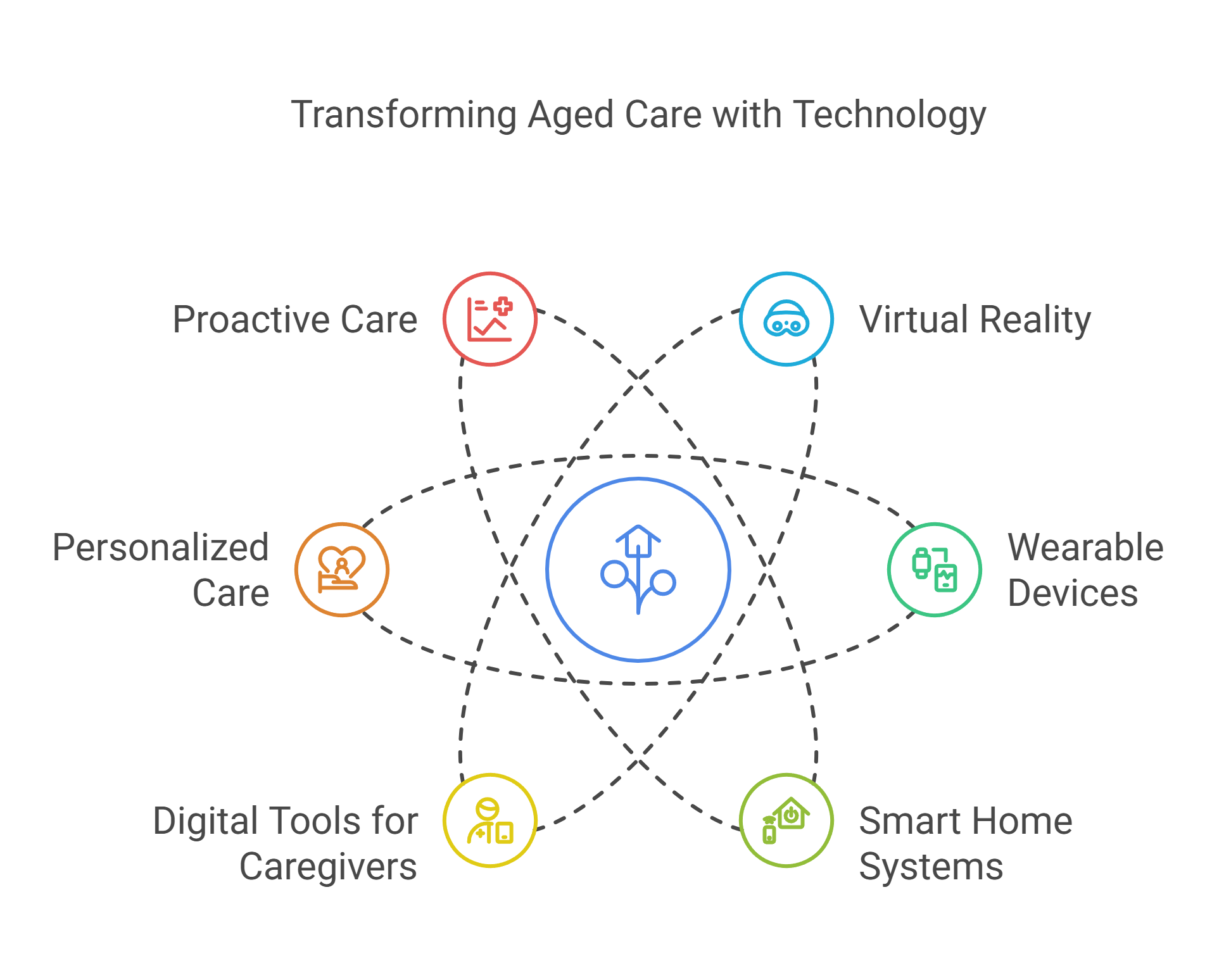Growing Technology And Innovation In Aged Care

Title Tag:
Revolutionizing Aged Care: The Power of Technology and Innovation
Meta Description:
Explore how cutting-edge technologies and innovative solutions are transforming aged care—enhancing lives, empowering caregivers, and redefining elder support.
Growing Technology and Innovation in Aged Care
Gone are the days when aged care facilities were perceived as outdated and impersonal. Today, the industry is undergoing a transformative shift, driven by groundbreaking technologies and forward-thinking innovations that elevate the quality of life for our aging population.
Imagine a world where residents engage with loved ones through immersive virtual reality, where wearable devices track health metrics in real time, and where smart home systems adjust lighting, temperature, or bed positioning automatically. That world is already taking shape—and it’s changing everything.
The benefits extend far beyond the residents. Caregivers and healthcare staff are empowered by digital tools that streamline operations, enhance communication, and provide actionable insights. These tools enable more personalized, proactive, and effective care.
In this guide, we explore the latest trends in aged care technology, the impact on residents and caregivers, and the promising future ahead. Let’s dive into the innovations redefining how we care for our elders.

Assistive Technologies: Supporting Independence and Safety
As the global elderly population grows, so does the demand for solutions that promote autonomy and safety. Assistive technologies are stepping up, offering residents greater comfort and independence.
Smart home technologies now allow living spaces to automatically adapt to residents' preferences—adjusting lighting, temperature, and bed positioning. These intelligent systems can detect falls, monitor medication compliance, and alert caregivers in emergencies.
Wearable health devices, such as smartwatches and fitness trackers, provide real-time data on vital signs, activity levels, and sleep patterns. This information enables caregivers to tailor care plans and intervene before minor issues escalate.
Communication technologies play a vital role in reducing social isolation. Tools like video calls and messaging apps help residents stay connected with family and friends, boosting mental well-being and emotional resilience.
Data Analytics: Driving Smarter, Safer Care
Data is revolutionizing aged care, giving providers the tools to make informed decisions and optimize outcomes.
Predictive analytics allows caregivers to identify early warning signs. By analyzing health records, medication usage, and incident reports, providers can anticipate risks such as falls or cognitive decline and take preventive measures.
For instance, tracking residents’ activity levels can signal mobility changes, prompting timely interventions. Monitoring medication adherence and correlating it with health outcomes can reveal opportunities for improvement in treatment plans.
Facility managers also benefit. Data-driven insights help streamline operations—predicting staffing needs, reducing waste, and allocating resources efficiently. Whether it's optimizing dietary planning or managing schedules, analytics brings precision and clarity.
Innovative Therapies: Enhancing Quality of Life
Therapies in aged care are evolving, with technology playing a central role in enhancing resident well-being.
Virtual and augmented reality (VR/AR) are opening new dimensions in therapeutic engagement. These tools allow residents to virtually visit cherished locations or participate in interactive memory games—boosting cognitive health and emotional connection.
Music therapy, amplified by technology, allows for the creation of personalized playlists tailored to each resident’s preferences and cognitive needs. Studies show music can reduce anxiety and pain, improve mood and sleep, and even enhance memory and alertness.
These therapeutic tools aren’t just engaging—they’re profoundly impactful in fostering joy, relaxation, and healing.
Collaboration and Communication: Unifying the Care Ecosystem
Effective aged care relies on seamless communication between all stakeholders—caregivers, residents, families, and administrators. Technology is making this coordination easier and more transparent.
Cloud-based communication platforms enable real-time sharing of care plans, medical records, and updates between care teams. This ensures continuity and improves care quality through collaboration.
Residents and families also benefit from tools that enhance engagement—video conferencing, messaging apps, and portals that provide access to schedules, records, and updates. These connections reinforce trust and emotional support.
Moreover, by giving residents access to their own care information, technology encourages autonomy and shared decision-making—essential components of person-centered care.
.png)
The Future of Aged Care: A Vision Powered by Innovation
Looking ahead, the future of aged care will be defined by continued innovation, with technologies like artificial intelligence (AI) and machine learning leading the way.
Imagine AI-powered systems that predict care needs, adjust environments in real time, and flag health issues before they surface. Or machine learning tools that process complex datasets to craft individualized care strategies based on trends and predictive models.
Outside facility walls, technology will support aging in place—enabling seniors to live independently through smart homes, telehealth services, and remote monitoring.
Yet, the success of these technologies depends on thoughtful integration. This means investing in training, fostering innovation, and creating a culture of continuous improvement. Most importantly, it involves listening to residents and families, ensuring solutions truly align with their needs and preferences.
Conclusion: Embracing a New Era of Aged Care
The aged care landscape is undergoing a profound transformation. From smart homes to predictive analytics, from immersive therapies to AI-driven personalization—the industry is poised to deliver more compassionate, connected, and effective care than ever before.
By embracing these innovations and keeping humanity at the heart of every solution, we can ensure that aging is not just managed—but celebrated.
Let’s shape a future where technology enhances dignity, supports independence, and enriches the lives of every elder in our care.